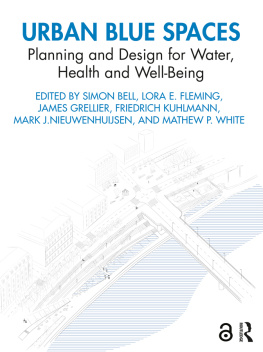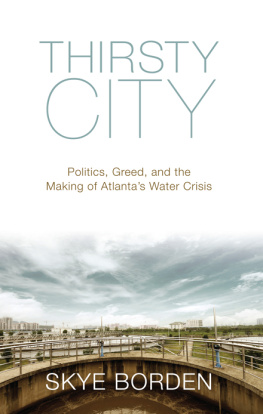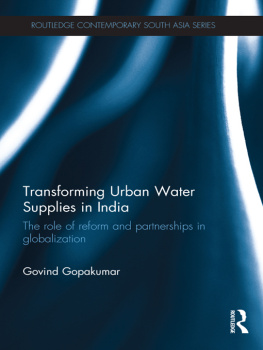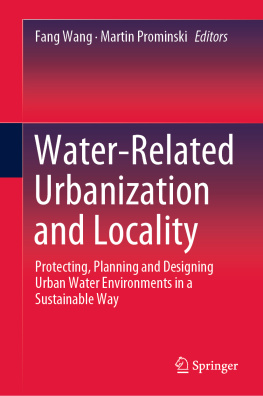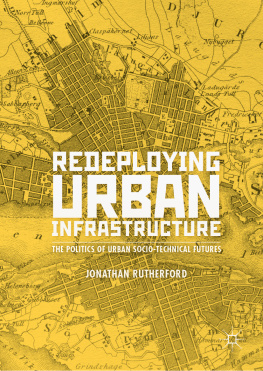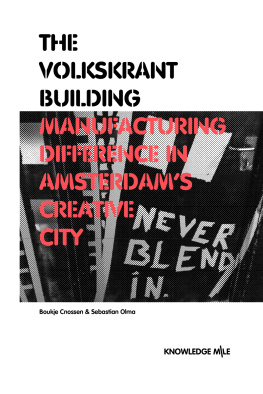The Politics of Urban Water
The Politics of Urban Water
CHANGING WATERSCAPES IN AMSTERDAM
Kimberley Kinder
2015 by the University of Georgia Press
Athens, Georgia 30602
www.ugapress.org
All rights reserved
Designed by Kaelin Broaddus
Set in 9.5/13 Scala by Graphic Composition, Inc.
Most University of Georgia Press titles are available from popular e-book vendors.
Printed digitally
Library of Congress Cataloging-in-Publication Data
Kinder, Kimberley.
The politics of urban water : changing waterscapes in Amsterdam / Kimberley Kinder.
pages cm
Includes bibliographical references and index.
ISBN 978-0-8203-4794-3 (hardback) ISBN 978-0-8203-4795-0 (paperback) ISBN 978-0-8203-4836-0 (ebook) 1. Urban renewalNetherlandsAmsterdamCitizen participationHistory20th century. 2. Urban renewalPolitical aspectsNetherlandsAmsterdam. 3. Urban renewalSocial aspectsNetherlandsAmsterdam. 4. WaterfrontsNetherlandsAmsterdam. 5. Sociology, UrbanNetherlandsAmsterdam. I. Title.
HT178.N42A456 2015
307.3'41609492352dc23
2014036311
British Library Cataloging-in-Publication Data available
To my mother
Contents
Acknowledgments
Several institutions provided financial support for the research and writing of this book, including the National Science Foundation (Grant No. 0903073), the Geography Department at the University of California, Berkeley, and the University of Michigan Society of Fellows.
This book would not have been possible without the interviewees in Amsterdam. Their advice and insights profoundly shaped the research trajectory as it unfolded.
The faculty at the University of California, Berkeley, provided invaluable support and guidance during the research and early write-up phases for this book. Michael Watts, Richard Walker, Teresa Caldeira, and Jake Kosek contributed most heavily to this work. Other influential mentors included Gill Hart, Paul Groth, Donald Moore, and Daniel Buck.
My special thanks go to Mick Gusinde-Duffy and the rest of the editorial staff at the University of Georgia Press, as well as to their anonymous reviewers, whose comments and advice elevated the level of analysis throughout the book. Similarly, at the University of Michigan, I owe a debt of gratitude to Rebecca Sestili for her sage publishing advice and to the members of the informal Michigan Society of Fellows Humanities Writing Group.
A small portion of this book appeared as a freestanding article in Environment and Planning A. The anonymous reviewers for that article provided valuable feedback that strengthened the project as a whole.
I presented portions of this book to several academic audiences between 2010 and 2012. The comments and questions I received from those audiences influenced the books development. Conference audiences included attendees at several Annual Meetings of the Association of American Geographers, the American Society for Environmental History Conference on History and Sustainability, the Mini-Conference on Critical Geography, and the Biennial Conference of the Urban History Association. Additional audiences at the University of Michigan included the Michigan Society of Fellows, the Urban and Regional Planning Program, and the School of Natural Resources and Environment.
This book would not have happened without the intellectual and emotional support of my Berkeley cohort. Most notably, Jen, Greta, Sapna Alex, and Sarah: thank you.
At the most personal level, thank you to Ross, who was there through it all, Charlie, who arrived partway through, and Cora, who came in at the end.
INTRODUCTION
The Politics of Urban Water
The face of urban water has changed dramatically since the mid-twentieth century. During the transition from industrial production to service-oriented economies, waterfronts emerged as prime redevelopment sites across Europe and North America. City builders transformed defunct factories and harbors into festival marketplaces and mixed-use neighborhoods. These changes marked an important paradigm shift in the economic functionality of shorelines. On paper, this paradigm shift appeared swift and decisive, dominated by large-scale infrastructural redevelopment that integrated brownfield sites into the changing economy by creating new motifs of water-oriented living and leisure. In practice, however, reimagining water was a slow, winding process, punctuated by several small shifts and provisional appropriations that reworked the meaning of wet urban spaces. Moreover, new uses of water have continued to emerge, signaling that the spatial forms and political valence of urban water remain decidedly open-ended.
The stereotypical narrative of urban waterfront transformation crystallized in the early 2000s. Industrial-era economic growth involved the dramatic re-engineering of hydrological landscapes for shipping and manufacturing. Subsequent deindustrialization after World War II drained waterfronts of capital and labor power, leaving abandoned brownfields in their wake. By the centurys end, real estate investors working through public-private partnerships had built new, ostentatious cultural centers and mixed-use neighborhoods in scores of cities, including, for example, Baltimore, Sydney, Toronto, and London. These shorelines attracted elite workers and shoppers, and they gave older cities a new global face in the competition for future economic growth.
Case histories and architectural profiles of these spatial transformations generally read as top-down affairs with investors capitalizing on self-evident rent gaps in supposedly derelict spaces. Recent scholarship describing informal occupancy and provisional uses of these spaces prior to their redevelopment has successfully dispelled notions of waterfronts as tabula rasa sites.insights underscore the need for greater attentiveness to the formative role of cultural practices and regulatory structuresalongside market pressurein processes of waterfront reinvention. The history of water in Amsterdam shows that shoreline sites of disinvestment only appeared as rent-gap spaces once alternative uses of those spaces became thinkable. Cultural movements and everyday practices that connected water to countercultural activism, heritage preservation, and ecological resiliency transformed the meaning of water and redirected the modes of waterfront development.
Amsterdam was an especially apt location to study these changes for several reasons. Amsterdam is famous as a water city. Its historic canals are a major international tourism attraction, and many prominent cultural institutions and elite neighborhoods face canals, harbors, or other water surfaces. Additionally, large-scale waterfront reconstruction in Amsterdam was proceeding rapidly during the early 2000s at the same moment that, internationally, architects and planners were heralding the imagined climax of the postindustrial water-oriented real estate development model. The ubiquity of water in the local landscape created heightened conditions of possibility for water to have especially deep and diverse cultural meanings and, by extension, for these cultural connotations to influence large-scale processes of waterfront transformation.
Using Amsterdam as an example, this book unsettles the master narrative of urban waterfront revitalization on three fronts. Beginning with a focus on the past, the book exhumes a genealogy of praxis that analyzes the most widely discussed social movements making provisional use of the citys shorelines in the decades preceding the formal, capital-intensive, infrastructural reconstruction underway in the early 2000s. Next, the project foregrounds the social narratives of water that connected past cultural practices to subsequent waterfront investments, underscoring the influence of these narratives in enabling, derailing, and reorienting the process of waterfront transformation. Then the book evaluates future-oriented narratives that, since the early 2000s, have begun connecting water with a shifting set of political impulses that are replacing the site-specific focus of brownfield projects with a more generalized discourse of water-based urban growth involving larger geographic footprints and a wider range of political stakeholders.


